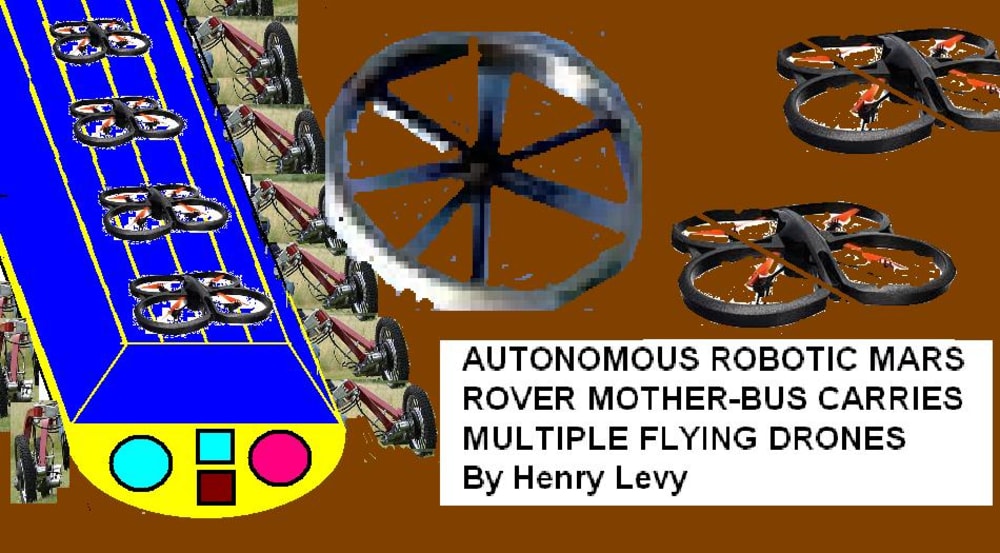This autonomous robotic rover mother-bus carries multiple flying exploratory scout drones to explore the surface of Mars. Driving autonomosly far from its Mars base station, the mostly ground based rover-bus can launch preprogrammed far flying scout drones. The rover-bus can ride on Mars’ surface or itself fly over hills, craters, and mountains. Any of the flying scout drones, as well as the rover-bus, may contain multiple cameras with visible, infrared, and / or ultraviolet active or passive image sensors that photograph the Martian surface and sky. Night vision, telescopic vision, and microscopic vision cameras are on the rover-bus. Spectrophotometers, radiation detectors, a magnetometer, ground drill, and atomic spectrometers are also onboard the rover-bus. A very wide area can be photographed by the flying drones from both sides of the the rover-bus’ path. Each drone and the rover-bus can project light to illuminate objects to be photographed in darkness. Each drone can control an attached micro-mini robotic arm with end-effector clamping hand-like claw / clamp / drill / shovel / scoop to pick up very tiny soil samples and pebbles to carry back to the rover-bus to unload. The rover-bus also has at least one larger robotic arm with end-effector clamping hand-like claw / clamp / shovel / scoop to pick up larger soil samples and rocks. Upon returning, flying scout drones can recharge. Solar photo-voltaic panels on the surface of the rover-bus and / or electricity derived from a nuclear power source will be used to recharge the flying drones and rover-bus. Drones can be charged inductively or by direct connection. The rover-bus has a typical rover suspension, radar, FLIR, ultrasonic collision avoidace system, Google car-like autonomous guidance system, fuzzy logic and artificial itelligence navigation coupled with a positioning awarenes system. It also carries ground penitrating radar. Computers and tranceivers control all functions including radio control overide of preprogrammed missions of the flying drones. Radio control overide of the rover-bus is managed from tranceivers at the base statrion or from Earth with anticipated long transmission and receiving delays. Alternatively, Asimov-like robots can be deployed from the rover-bus. A helicopter type or octa-copter drone type of flying system can be used to enable the rover-bus to fly short distances. Fierce Martian winds, dust storms, temperature swings, and rocky cratered dangerous terrain must be anticipated.
There are many references to mother-ships carrying flying saucers in science fiction literature & movies, many suggestins of flying aircraft carriers carrying aircraft, and DARPA solicitations for flying mother-ships to carry flying drones. Nazi Zeppilins carried planes. The here descrined invention is simpler, more practical easily implimentable, and doesn’t require difficult technologies needed to keep a mothers-ship flying in orbit or contuously in the atmosphere. This invention is easily and quickly materializable for use on Earth or on Mars whether the mother-bus flies or used even as a toy. Instead of risking human lives and carrying additional weight of fuel & life support systems, robotic missions are less risky, less expensive, and easier to implement than manned.
Like this entry?
-
About the Entrant
- Name:Henry Levy
- Type of entry:individual
- Patent status:none

